Almost There: Marilyn Monroe in "Some Like It Hot"
 Friday, September 30, 2022 at 9:00AM
Friday, September 30, 2022 at 9:00AM 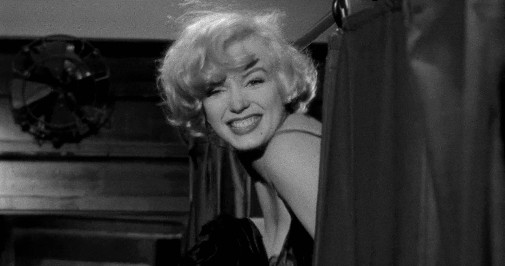
September started with the Venice Film Festival where Andrew Dominik's controversial Blonde premiered and closes with its arrival on Netflix. As a Marilyn Monroe fan who tried and failed to get through Joyce Carol Oates' doorstop of a novel, I had early apprehensions about this production and its fictionalized account of the star's troubled life. However, the combination of a gorgeous-looking trailer and moralistic backlash online led me to anticipate the movie with bullish optimism. Yet, having seen the thing, I'm afraid I can't sincerely take on a contrarian positive take nor defend most aspects of the misbegotten mess.
Worst of all, I'm stricken by the picture's puddle-deep purview of stardom, image-making, and Monroe herself as a person and phenomenon. Considerations of her as an actress are similarly shallow, verging on nonexistent. This is especially disheartening because, above all else, she was an amazing actress whose talent is often overlooked, either obfuscated by the glare of tragedy or dismissed by those who can't see beyond media objectification. So, to combat both narratives, let's remember Marilyn Monroe, the actress, in one of her best films – Billy Wilder's Some Like It Hot…
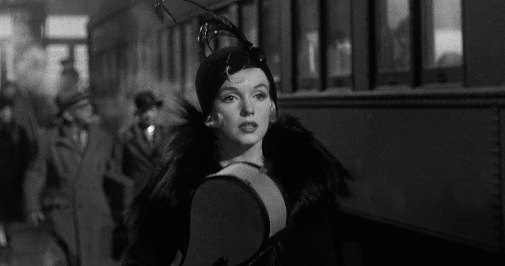
First, one has to address the elephant(s) in the room. There's no way around it – shooting Some Like It Hot was s a living hell for almost everyone involved, most of all Marilyn Monroe. She came into the project after an 18-month hiatus from Hollywood, time spent recovering from one of the multiple miscarriages she suffered while married to Arthur Miller. Judged as unprofessional by her colleagues, the actress was her unpredictable self. Sometimes, she worked through long scenes without a hitch, getting it done in one take. Then, other times, she floundered to remember a few short lines.
By all accounts, her mental state wasn't all that stable, made worse by a high-risk pregnancy that Orry-Kelly's Oscar-winning costumes work overtime to conceal. Before the production was over, she'd miscarry again, in part due to longtime issues with endometriosis. Monroe suffered but managed to produce movie magic along the way, elevating the role into a full-bodied, three-dimensional character that works as the glue holding the film together. She's its aching wounded center, wherein mirth and misery swirl into each other, embracing until two become one. She's so good that some theorize Monroe's flubbing was intentional.
Maybe it was a way to get fired from a job she didn't want anymore. Or perhaps it was to wield power away from Wilder, ensuring her conception of Sugar ended up on-screen and that Paula Strasberg was allowed on set. Whatever the case, I'd argue none of it is of great importance when considering the merits of Monroe's performance. What's crucial is that it works, and boy does it work. So much so that I don't think you could tell that there was so much behind-the-scenes kerfuffle watching the film without further context. I know I didn't realize it when first encountering it as a classic comedy rather than a canonical title loaded with backstage gossip made myth.
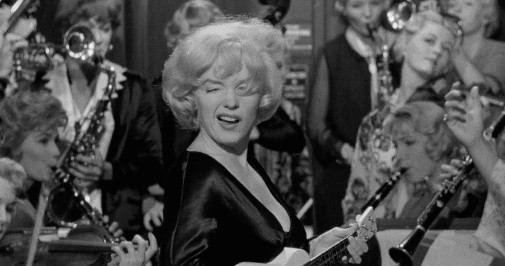
In that spirit, let's move on to the picture proper before finding more film shoot controversy to unearth. Adapted from the 1935 French film Fanfare of Love and its 1951 German remake Fanfares of Love (Teutonic audiences yearned for more than one fanfare), Some Like It Hot tells the story of two musicians on the run. In February 1929, Joe and Jerry find themselves in the wrong place, wrong time, becoming unwitting witnesses to a mass murder not unlike the real-life Valentine's Day Massacre. To escape the gangsters, the two disguise themselves as women and go on a trip to Miami as the new members of an all-female band.
While on the train, the newly baptized Josephine and Daphne find themselves in a tricky situation. To be safe, they must maintain their drag personas and lay low. However, the singer/ukulele player Sugar Kane is a gorgeous temptation who might just blow their cover. Keeping their desires under wraps, they become the woman's gal pals, but when in Miami, Joe devises a cunning plan to seduce her without revealing that Josephine isn't real. He assumes the identity of an impotent millionaire, as one does, and the two end up enamored through layers of duplicity. There's another romance brewing and more mafia drama to contend with, but that's the gist of it.
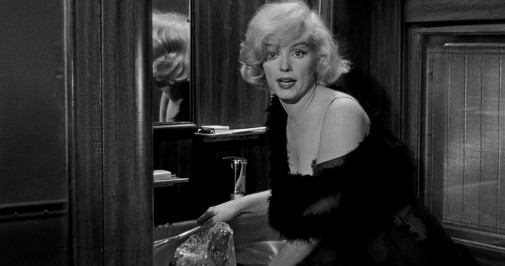
Initially, the part of Sugar was conceived as a supporting presence to Lemmon and Curtis' crossdressing shtick, intended as a sort of straight man figure amid the madness. Mitzi Gaynor was the intended star at this time, but her commitment to South Pacific's big-screen adaptation brought about unbendable scheduling conflicts. Though, according to some Wilder notes – he contradicted himself on the matter throughout the years– as the weakest part, Sugar needed the strongest casting, and only Marilyn Monroe would do. Not that the actress was so sure about her rightness for the role or even the script.
Legend says Monroe was mainly preoccupied with her character's motivations, but a piece of advice courtesy of Lee Strasberg solved the puzzle. Rather than playing up Sugar's potential stupidity regarding the disguised men, she instead conveys a desire for female friendship, something half-mad but heartfelt that transcends any mean-spirited judgments about the singer's wits. This is somewhat contradicted by the easy camaraderie between all the band members during their train journey. However, that doesn't matter when the backbone of Sugar's characterization makes such emotional sense. At times, it's like the film reimagines itself around her inner depths.

But of course, there's always darkness lurking beneath the froth, the earnestness. She's got a rocky past revealed in a negligee-clad monologue that hints at unsurmountable loneliness that's a bit like when you get the fuzzy end of the lollipop or are left with nothing but a tube of toothpaste with all the toothpaste squeezed out. Delivering these lines, tossing them off with casual self-loathing, Monroe illuminates her character's interiority and manages to reconfigure the way the in-film and off-screen audience regard her. There's longing, a need out of show business-bound existence lived between gigs and heartbreaks, a flask at the ready to soothe the pain.
All that said, Marilyn Monroe's performance in Some Like It Hot is not primarily an expression of sorrow. More than anything, it's a celebration of joy, funny and full of warmth, a sense of ebullience that carries you from the movie's frantic plotting to its quiet interludes. Such marvels relate closely to the star's unique presence, usually attributed to a singular mixture of vulnerability and provocation. However, to reduce Monroe to that is erroneous. Moreover, it doesn't begin to explain her comedic triumphs, chief among them Some Like It Hot. Consider that, despite on-set clashes, Billy Wilder had good things to say about his leading lady, stating that "She is a master of delivery. She can read comedy better than anyone else in the world."

Sugar also exemplifies a strange quality that Monroe always imbued her 'dumb blonde' characters with – intelligence. Like Lorelei Lee, Elsie, Miss Casswell, and many others before her, Sugar Kane née Kowalczyk wears naivete as a mask that's not even skin-deep. See beyond it, and you find pragmatism, broken dreams, an ability to see the world for what it is, and maybe a deliberate choice to look the other way. There's complex humanity in her portrayals of these women, even if directors and scriptwriters hadn't intended it to be so, a slight twist that cannily subverts sexist tropes even as it appears to support them.
Hell, the singer calls herself dumb in a moment of performed self-awareness that can't help but puncture the archetype. The subversion is done in a careful balance, never tipping too far into a betrayal of the film's ode to those who like it hot and surrender wholly to the pleasure of it all. The "I Wanna Be Loved By You" performance, for example, represents a pinnacle of Sugar and Marilyn's sexual objectification within Some Like It Hot, its hedonistic abandon in full bloom. Visually, figure-hugging tulle delineates the star's body, covered in sequins, lace, and fringe that look like whispers of glimmer over naked flesh when seen through the camera.

As far as Charles Lang's cinematography is concerned, this game of insinuation is underlined by the lighting, a shadow sitting midway through the cleavage like an immaterial coverup. It's a parody of modesty that only makes the sensuality more acute. Still, despite it all, this scene belongs to Sugar through-and-through rather than a metaphorical male gazer, and not just because she's the ogled body. Monroe's breathy delivery both serves as Betty Boop-like titillation and as an underlining of Sugar's softness, the tender soul existing out of reach and beyond the smokescreen of sex appeal. Indeed, she is sex personified, openly flirting with the camera and thus regaining power from it.
You see, this singer is never being unwittingly turned into sex on stage. She's performing it with full knowledge, looking around to see if it's working and if her target is watching. Part of it is the layers of performance implied when an entertainer plays an entertainer. Part of it is this magnetic charge that electrifies the screen whenever Monroe does away with one-dimensional sincerity and playacts putting on a show. Part of it is that the breathy delivery and coquettish mannerisms only appear when Sugar knows she's before men and recedes whenever it's just girls. From variation comes modulation comes dimension. Another scene that showcases this comes during the absurd seduction.

Using what he knows about her preferences in men, Joe creates Junior, the aforementioned millionaire character who's everything Sugar ever dreamed of. That goes beyond his superficial charms, wealth, and Cary Grant-like cadence. Embodying an idea of sweet helplessness, he becomes a passive figure in the seduction, allowing Sugar to be more dominant, active in her pursuit, convinced he's impotent and in need of her help. This game of traditional gender roles twisted out of shape depends on Monroe. Thanks to her, Sugar's beguilement is precisely articulated and laced with agency, a physicality revealing clear intent, while never betraying the script's comedic gambit or the singer's previous characterization.
For what it's worth, Curtis didn't like shooting this love scene, primarily because of his costar's demand for retakes. His fury was such that the actor later commented that kissing Monroe was like kissing Hitler. In her last interview for LIFE Magazine, the actress addressed her costar's words: "If I have to do intimate love scenes with somebody who really has these kinds of feelings toward me, then my fantasy can come into play. In other words, out with him, in with my fantasy. He was never there." She pulls it off, and all you can see on-screen is a fantasy made flesh, falling in love and lust crystalized in celluloid as prelude to pitiful heartbreak.

These candid sentiments, this flare of sensuality and want, are central to the movie and Marilyn's careful characterization. What you want is essential to what you are, after all. In more ways than one, Some Like It Hot is about who we are, as understood through what we want and pursue. It's about how one escapes from oneself and, in the process, finds another self that might be truer than the first. Or maybe it's just a better version of the past self, spruced up and energized by a new costume, a new outlook, and the revelations that come along with it. This happens to Joe and Jerry, clearly, but it's also Sugar's journey from that smoky train platform to the back of a motorboat going who knows where with only love on her mind.
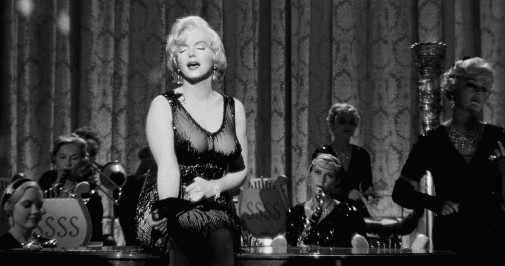
Though she made the industry fortunes beyond one's wildest dreams, Hollywood never had much respect for Marilyn Monroe. So it's no wonder an Academy Award nomination eluded her to the very end. Still, she came close for her comedic tour-de-force in Some Like It Hot, which earned critical acclaim and won her the Golden Globe along with other honors. Even international film festivals recognized her work, with the Faro Island Film Festival bestowing Monroe with a juried Best Actress prize as well as a trophy voted by its audiences. And yet, that wasn't enough for AMPAS. Though Some Like It Hot nabbed six nominations, Best Actress wasn't among them.
The five nominees in that category were Doris Day in Pillow Talk, Audrey Hepburn in The Nun's Story, Katharine Hepburn in Suddenly, Last Summer, Simone Signoret in Room at the Top, and Elizabeth Taylor in Suddenly, Last Summer. In an unexpected turn of events, the French star came out victorious. As for Monroe, she only completed two more features after Some Like It Hot – 1960's Let's Make Love and 1962's The Misfits. Though the latter presented another excellent opportunity to honor the actress, the Academy remained impassive regarding her brilliance, screen presence, and genius performances whose power endures far beyond a much-exploited, far-too-brief life.

Like many Monroe movies, Some Like It Hot is not available to stream but readily available to rent or purchase.



Reader Comments (15)
Very true about MM in The Misfits
I appreciate the depth in this piece,you are obviously a big fan,it's nice to read something on her roles rather than her tragedies and persona.
You are correct that Blonde captures nothing of MM the star or actress,I found it scummy and sensationalist masquerading as an arthouse biopic,i'd take Bohemian Rhapsody over that mess.
The films seemed to dislike Marilyn and made her less than appealing,Armas was fine but not award worthy stuff.
Nice insight into her work.
In my opinion all the major awards this year (excepting Best Supporting Actress-I ADORE Joan Shawlee's performance of Sweet Sue but it's so tiny) should have gone to Some Like It Hot including the Best Actress for Marilyn.
It's not quite as bitter a pill that she didn't because Simone Signoret was entirely deserving of the prize for her phenomenal work in Room at the Top but the lack of a nomination for Marilyn is appalling. Could say the same for the absence of the film itself (a real head-scratcher), Tony Curtis and the sublime Joe E. Brown. There was certainly room for them to substitute for an actual nominee in each category.
I agree that Marilyn is underestimated as an actress. She couldn't play everything (few can) but she was an exemplary comedienne and fine in drama. Sugar Kane is one of her best creations but even when she was indifferent to the material (River of No Return comes to mind) she's still arresting because of her innate connection to the camera's lens. It kills me when people say she was just playing herself, obviously they've never seen a single interview with her or read anything about her and the fact that for the most part she was a shy, soulful, bookish woman who liked to cook with profound emotional insecurities rooted in her upbringing (such as it was).
I thought "Blonde" was a fascinating mess of a movie and Armas captured her sadness to the same brilliant degree that Kristen Stewart did with Princess Diana in "Spencer." What the movie did not do well, which was my main problem with "Spencer," was capture what made her a legend. Marilyn Monroe was a megawatt star, the likes of which don't really exist anymore. Princess Diana had the same glow on a different level. Yes, they were both sad, but it's that indescribable it factor that made them loved by the masses.
"Some Like It Hot" is Marilyn at her absolute zenith.
I thought "Blonde" was a fascinating mess of a movie and Armas captured her sadness to the same brilliant degree that Kristen Stewart did with Princess Diana in "Spencer." What the movie did not do well, which was my main problem with "Spencer," was capture what made her a legend. Marilyn Monroe was a megawatt star, the likes of which don't really exist anymore. Princess Diana had the same glow on a different level. Yes, they were both sad, but it's that indescribable it factor that made them loved by the masses.
"Some Like It Hot" is Marilyn at her absolute zenith.
Part of me wonders if she would’ve been nominated (and possibly even have won?) had the studio pushed her in the supporting category. To be clear, I don’t think her role is supporting as this is really a classic three-lead film, but she does have substantially less screen time than Lemmon and especially Curtis, so of course in today’s awards landscape she’d probably be considered supporting (but then again, they’d probably stick either Lemmon or Curtis in the supporting category too since apparently no studio likes to campaign two leads in the same category anymore).
I'd still give the Oscar to Katharine Hepburn as it's my favourite performance of hers with Simone runner up and Marilyn third before 4th and 5th Audrey and Liz.
I love Monroe in Some Like It Hot. She is my personal Best Actress winner for 1959. Yet, I don't think she was "almost there." The category had strong nominees with solid narratives and a line of worthy runners-up.
Liz and Kate were assured nominees for Suddenly Last Summer. They attained great industry respect for exemplary performances and their solid support of ailing Mongomery Clift against the harsh treatment to Clift from both the film"s producer and director.
Doris was an expected nominee, considered overdue after snubs for stellar work in The Man Who Knew Too Much and especially Love Me or Leave Me.
Audrey and Simone were leads (and locks) in Best Picture nominees.
In additon to Monroe, other also rans included Milly Perkins as the doomed Jewish teen in The Diary of Anne Frank, Lee Remick as the alleged rape victim in Anatomy of a Murder, Lana Turner as a struggling single mother in Imitation of Life, and former Oscar winner Eva Marie Saint as the cool government spy in North by Northwest. Tough to snag a nod for a leading lady who was unpopular with her peers.
I have always thought Monroe was closer to a nomination three yesrs earlier against a smaller field for her memorable work in Bus Stop.
This film is fucking great. Marilyn is at the top of her game. She's hilarious, entertaining, full of life, and also can be vulnerable. It still holds up as that ending was way ahead of its time. I own the film on Criterion DVD though I need to upgrade it on Blu-Ray.
This film is fucking great. Marilyn is at the top of her game. She's hilarious, entertaining, full of life, and also can be vulnerable. It still holds up as that ending was way ahead of its time. I own the film on Criterion DVD though I need to upgrade it on Blu-Ray.
Mike - I'm watching Blonde right now, and while I'm still not sure what to make it, I feel like that if either this film or Spencer tried to capture what made either Marilyn or Diana "legends" would be missing the point, given that a big part of what made them "legends" is our perceptions of them, and both Blonde and Spencer are films that detail the horrors of having to live in the skin of these women who are seen by the rest of the world in very specific ways. Calling someone a "legend" must be a very heavy burden on someone, and these are films about women buckling under the weight of that particular perception and their attempts to make the world notice that burden, or else find ways of escaping it. So far, I feel Spencer is more successful at that, mainly because it zeroes in on a very specific time frame, but maybe the ultimate point is painting a picture that takes these particular figures off the pedestals we put them on.
Off the top of my head, Marilyn should have been nominated at least 4 times...
Bus Stop
The Prince and the Showgirl (win, she annihilated Olivier!)
Some Like it Hot (win)
The Misfits (probably win)
SO underrated as an actress
If you’re ever in San Diego, stay at the beautifully retro Hotel del Coronado, where the “Florida” scenes were filmed. Looks exactly the same, and they have some of the memorabilia on the walls. It’s a bit of a fancy stay but amazing nonetheless.
@Paranoid Android- Coronado is beautiful. You get a sense of the history. It is kinda pricy but best to book in the off season for discounts.
I don't think Marilyn was ever going to get a nomination. She had fought against the system for a while and she was getting work because she was bankable not because she had respect from the men in charge. I think if she had lived longer, she would eventually have gotten an honorary award years later, similar to how Hepburn and Taylor did. But a lot of people in Hollywood did not respect her as a performer nor as a person. However talented she was, (and she was-absolutely) the industry did not appreciate her.
Marilyn was really great here, and it's one of the great unnominated performances of the 1950s. However, like others, I'm not sure she was almost there. Given how tied the Academy still was to the studios at the times, I have a feeling her "difficulty" during production probably hurt her. The academy also liked prestige actresses, or for their actresses to fully remake themselves as prestige actresses, something she never got the chance to do. The studio system was really hard on actors, and they were essentially given lanes. It's sad that Marilyn, who clearly was a great actress, never got studio support to crossover into the prestige lane.
I've also thought this was a rock solid line-up, with Shirley MacLaine just on the outside, and Lee Remick and Marilyn right after her.
Thanks for sharing this nice blog. And thanks for the information. Will like to read more from this blog.
Comprare Patente di Guida
Comprare Patente B
Comprare Patente C
Comprare Patente CQC
Acquista una patente di guida senza esami
Führerschein
FÜHRERSCHEIN ONLINE KAUFEN
fuhrerschein-kaufen
Mpu kaufen, legal & ohne Prüfung